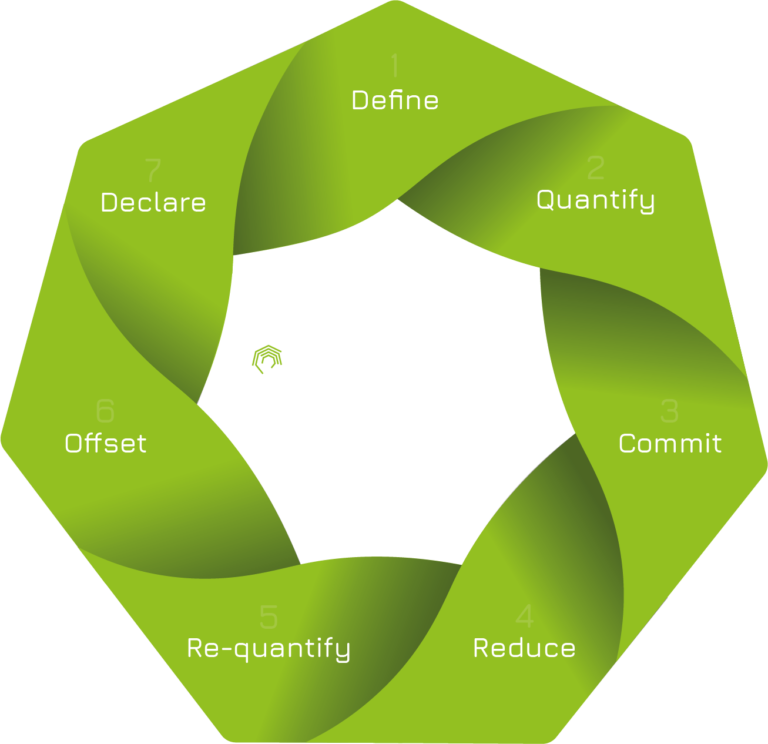Reducing your carbon footprint is vital in today’s environmentally conscious world, with businesses increasingly seeking ways to minimise their impact on the planet. A smaller carbon footprint not only contributes to combating climate change but also positions businesses as responsible and sustainable entities in the marketplace. Carbonology® combines a wealth of experience in assisting businesses to achieve carbon neutrality and adhere to ISO standards successfully, providing expert guidance in developing effective carbon reduction plans.
In this comprehensive guide, explore the different strategies that businesses can implement to reduce their carbon footprint, and learn how Carbonology® can facilitate the integration of these strategies into your organisation’s operations. Embrace the journey towards a sustainable, environmentally responsible business model while reaping the benefits of cost savings, enhanced reputation, and competitive advantage.
What are the Strategies for Reducing Your Business Carbon Footprint?
1. Conduct a Carbon Audit and set Reduction Targets
The first step in reducing your business’s carbon footprint is understanding its current emissions. Conduct a comprehensive carbon audit to identify emission sources, emissions quantities, and areas for improvement. Utilise your carbon audit data to set realistic, achievable carbon reduction targets, taking into consideration industry benchmarks and regulatory requirements.
Carbonology® can support businesses in conducting comprehensive carbon audits and setting ambitious yet feasible reduction targets, providing expert guidance based on their wealth of experience.
2. Improve Energy Efficiency
Improving your organisation’s energy efficiency plays a crucial role in reducing its carbon footprint. Consider the following actions:
a. Implement energy-saving technologies, such as LED lights, smart thermostats, and energy-efficient equipment and appliances.
b. Optimise building design and insulation to reduce heating and cooling demands.
c. Conduct regular audits to identify and rectify energy wastages, such as leaks in compressed air systems.
d. Educate employees about energy-saving practices and encourage behaviour change, e.g., switching off lights and equipment when not in use.
Partnering with Carbonology® ensures businesses benefit from tailored advice and support, leading to effective energy efficiency improvement measures for carbon footprint reduction.
3. Transition to Renewable Energy Sources
Embracing renewable energy sources, such as solar, wind, or hydropower, can significantly reduce your business’s carbon footprint. Some possible strategies include:
a. Installing on-site renewable energy systems, e.g., solar panels or wind turbines
b. Purchasing Renewable Energy Certificates (RECs)
c. Joining green tariff programmes offered by energy utilities
d. Opting for Power Purchase Agreements (PPAs) with renewable energy providers
Adopting renewable energy options can be complex and requires expert guidance. Carbonology® ‘s team is well-equipped to help businesses identify and execute the most suitable renewable energy strategy, simplifying the transition towards green power.
4. Foster Sustainable Supply Chain Management
A business’s carbon footprint often extends beyond its direct operations into its supply chain. Engage with suppliers and partners to improve sustainability and reduce your overall carbon footprint by:
a. Mandating sustainable procurement practices, e.g., selecting suppliers with robust environmental and social performance records.
b. Encouraging suppliers to adopt sustainable materials, packaging, and production methods.
c. Supporting transparent and ethical sourcing, targeting shorter, local supply chains to reduce transportation emissions.
d. Implementing monitoring and reporting systems that track supply chain emissions and highlight areas for improvement.
Carbonology® can provide insights and guidance to help businesses create and implement sustainable supply chain management strategies, ensuring accountability and carbon footprint reduction.
5. Adopt Green Transportation Practices
Transportation is a significant contributor to your business’s carbon footprint. Explore the following green transportation measures:
a. Implement a company-wide policy promoting the use of public transport, cycling, or walking for work-related travel.
b. Establish carpool schemes to encourage ride-sharing among employees.
c. Introduce a green company fleet, adopting electric or hybrid vehicles to reduce Scope 1 emissions.
d. Optimise your outbound transport logistics, adopting fuel-efficient routing and delivery strategies.
Carbonology® ‘s expertise can help businesses identify and implement effective green transportation policies and practices, ensuring they successfully reduce their overall carbon footprint.
6. Encourage Remote Work and Digitalisation
By encouraging remote work and digitalisation, businesses can significantly reduce their carbon footprint:
a. Implement flexible work policies that enable employees to work from home regularly, reducing commuting emissions.
b. Prioritise paperless communication and documentation, embracing digital storage and file-sharing systems, and reducing paper consumption, and waste.
c. Opt for virtual meetings, webinars, and video conferencing platforms in place of in-person conferences or meetings, minimising travel-induced emissions and related environmental impacts.
Carbonology® can support businesses in adopting the most suitable digitalisation and remote work strategies that simultaneously reduce their carbon footprint and improve operational efficiency.
By undertaking these measures, businesses can significantly reduce their carbon footprint and work towards a sustainable and environmentally responsible future. Partnering with Carbonology® ensures that organisations benefit from expert support and practical guidance to achieve their carbon reduction goals effectively.
Take Action Towards a Greener Future with Carbonology®
In conclusion, businesses can take numerous practical steps to significantly reduce their carbon footprint, contributing to a more sustainable future for all. By conducting carbon audits, embracing energy efficiency, integrating renewable energy, fostering sustainable supply chains, adopting green transportation practices, and encouraging remote work and digitalisation, organisations can reinforce their commitment to environmental responsibility. Carbonology®’s unique blend of experience in guiding businesses towards carbon neutrality and compliance with ISO standards ensures that your organisation can tackle its carbon challenges with confidence and precision.
Don’t wait any longer to embark on your company’s carbon footprint reduction journey. Contact Carbonology® today to begin implementing the best strategies suited to your organisation’s needs, propelling you towards the goal of a more sustainable and environmentally responsible business. Ask us about our carbon consulting services!

